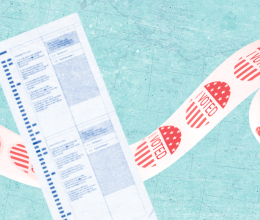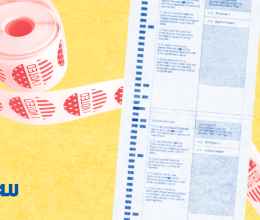This is the sixth in a series of posts focusing on issues we will be tackling at the 2014 ACLU of Ohio biennial conference, Resist. Reclaim. Restore Your Rights!
“Your voice is heard through your vote,” says Genise Jordan, a young mother and college student of Cleveland, Ohio. So what happens to those for whom voting isn’t easy? Do they deserve to have their voice ignored? No.
Throughout Ohio, voting is not always as accessible as it should be. Oftentimes, there are many barriers put in place that prevent people with disabilities from voting. In Ohio, over 1.6 million voters have a disability, yet easily accessible voting is often overlooked.
Register now for the 2014 ACLU of Ohio Conference
Just last month, 79 polling places in Franklin County had to be moved, due to lack of accessibility for people with disabilities. It is clear that in the past, voting locations have not always been easy to access, and it is necessary to change that in order to stop alienating these voters. With an updated Americans with Disabilities Act checklist, voting locations must now live up to stricter requirements. However, there are still many polling places throughout Ohio that may not be easily accessible.
Problems with accessibility are not just relegated to voting, but also to registering to vote. Ohio is way behind the times by not enacting legislation to allow online voter registration. So far, only people who have already been registered as voters can go online to change their address. This is not enough for many people, including those with disabilities, because they need to have opportunities to register to vote in the first place. People with disabilities, who may have difficulty traveling to a board of elections, post office or library, might stand the most to gain from an online voter registration system that would be accessible with the click of a mouse.
“If that ballot box, whether it’s a metaphor, or whether it’s a physical box, is kept from me, then I am being kept out of being a full citizen, and I’ve been deprived of my voice.” This is how Robert Harris, a Cincinnati resident who is a wheelchair user, feels.
While people with disabilities can benefit from online voter registration, it needs to be accessible to them. Websites need to be created to allow users who are blind or low-vision to use them. They also need to include American Sign Language so deaf and hard of hearing Ohioans can understand the information on the site.
In addition, you can only use online voter registration if you have a state issued ID or a driver’s license. This leads to the exclusion of many people who have a disability because they cannot obtain a driver’s license, or do not have the funds to pay for one. Often times the cost of the ID, the lack of supporting documents like a birth certificate, the amount of time and energy it takes to get to a location where they can get the ID, and the lack of transportation, makes it nearly impossible. Over 1 in 10 Ohioans lacks a photo ID, meaning that the state is excluding over 938,000 citizens from the opportunity to vote.
What’s the result of these policies? By being excluded, people with disabilities and low-income people often feel as though they are forgotten by elected officials. Chris Kerr, a Cleveland resident with Addison’s disease, explains, “people with disabilities think that the system isn’t for them.” Chris does not have a state ID because it is too expensive for him. Genise, who we met at the beginning of this article also does not have a state ID.
Elections are meant to bring everyone together to voice their beliefs, but instead they can alienate groups of people. We cannot continue to call ourselves a democracy, if we do not give everyone the equal opportunity to vote. We must ensure that every voice is heard.
Please join us on July 26, 2014, in Columbus, Ohio, to discuss this issue amongst many others. Our Resist. Reclaim. Restore Your Rights! conference will address many current civil liberties issues throughout Ohio.





